Thousands join school strikes over climate change
Thousands of young people have taken part in school strikes across Scotland and around the world to demand urgent action on climate change.
They were the latest in a series of strikes started a year ago by 16-year-old Swedish schoolgirl Greta Thunberg.
Organisers said 20,000 people joined the demonstration in Edinburgh, with thousands also gathering in Glasgow.
Events took place in all of Scotland's major cities, many towns and some islands including Iona and Skye.
The march in Edinburgh took 45 minutes to clear the assembly point at The Meadows, before making its way to the Scottish Parliament.
Thousands also gathered in Glasgow's Kelvingrove Park for a march which ended at the city's George Square.
An aerial picture posted on Twitter by the Police Scotland showed the square full of demonstrators.
Allow X content?
At least 15 demonstrators were held throughout Scotland.
Students in Papa Westray in Orkney had no town hall to protest outside - but instead organised a beach clean-up instead.
The young protesters are calling for an end to the burning of fossil fuels.
One of those taking part in Glasgow, 12-year-old Meabh, told BBC Scotland she was particularly worried about global warming leading to rising sea levels.
"I used to live on the Western Isles - it has been eroding and sinking down into the sea. I think I'm most worried about that because in 100 years there may be no Western Isles," she said.
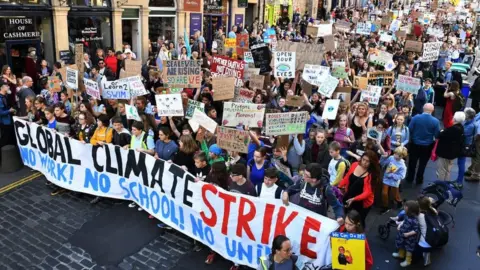 Getty Images
Getty Images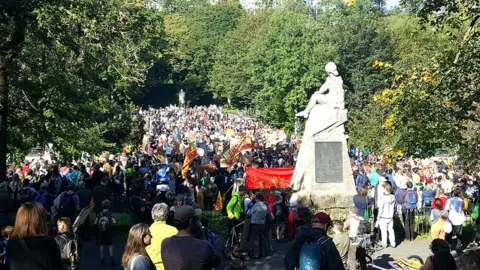
Glasgow University student Anna Warren, 18, said adults had been encouraged to join young people at the protests.
"This is where we can all come together to call on the government to make changes. It is such a broad thing because it allows everybody to join, it allow everybody to come and help us, and join the movement," she said.

Analysis by Kevin Keane, BBC Scotland environment correspondent
It's no surprise there are upwards of 15 protests taking place across Scotland with many thousands in attendance.
Here, climate change is firmly on the agenda with the Scottish government already committing to reach net-zero greenhouse gas emissions by 2045. That's five years ahead of the UK and one of the "most ambitious targets in the world," as the mantra goes.
But for the 15,000 people here in Holyrood Park, just across from the Scottish Parliament, that's still not enough. Posters read "It's now or never" and "There is no planet B".
In short, they want action immediately. But it's difficult for politicians here. Scotland has an oil and gas sector which props up its third biggest city. An instant end to using fossil fuels would devastate its economy.
That makes the arguments much more nuanced. But not for the thousands attending these protests in the searing sun who see their own future being destroyed by what's happening today.

Greta Thunberg, the Swedish teenager who has become a global figurehead on climate change, will be marching in New York after crossing the Atlantic by sailing boat.
She will address a climate summit at the UN General Assembly there next week.
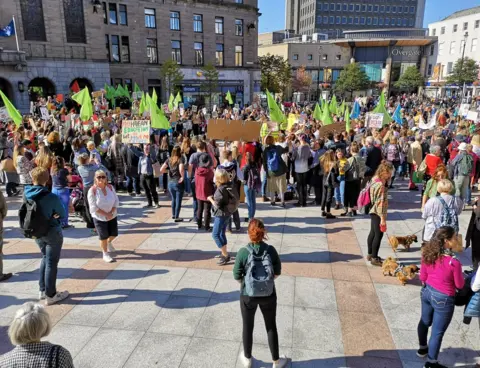
Scotland's largest teaching union, the Educational Institute of Scotland (EIS), has urged local authorities not to punish pupils who took part in the strikes.
General secretary Larry Flanagan said: "Whilst the EIS is not encouraging pupils/students to participate in anti-climate change strikes, we recognise that many will do so.
"We believe that their right to do so should be respected and that participants should not be sanctioned or punished as a consequence.
"If we are to encourage our pupils to be confident individuals that effectively contribute to society on global themes including sustainability, we shouldn't seek to punish them when they campaign for global sustainability."
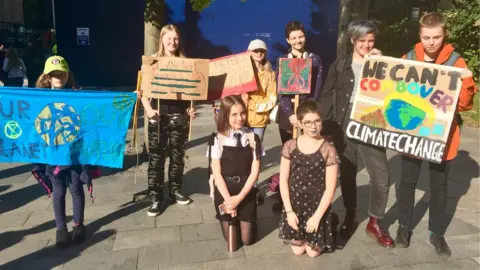
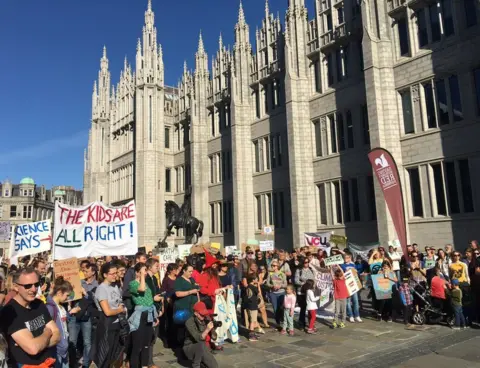
Student absence
The Scottish government said it was "pleased to see our young people actively engaging on the issue of climate change".
But a spokesman said student absence was a matter for individual schools to consider.
He added: "The global climate emergency and a Green New Deal for Scotland are at the centre of our Programme for Government.
"We are leading by example through bold actions. We are redoubling our efforts and we will end Scotland's contribution to global climate change by 2045."
Last month, Edinburgh councillors agreed to allow schoolchildren to take part in the protests for one authorised school day per year.
And they said no punishment would be levelled at pupils or parents if they chose to strike over a longer period.
However, the protesters were banned from Princes Street - which was on their planned route, heading to the Scottish Parliament - as it would mean tram services having to stop.

'Stand with them'
Stop Climate Chaos Scotland, an umbrella organisation for 40 unions, faith groups and community groups, said were "out in force" in support of the protest.
Spokeswoman Kat Jones said: "The young strikers are bringing the voice of the future powerfully into the present day.
"They describe the stark reality of climate breakdown and what it means for the world's future, their adulthood."
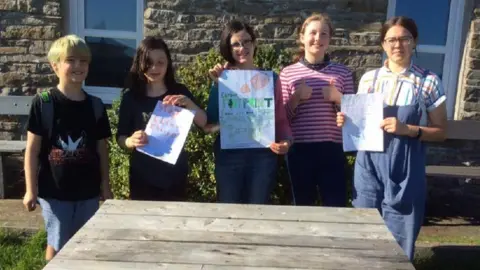
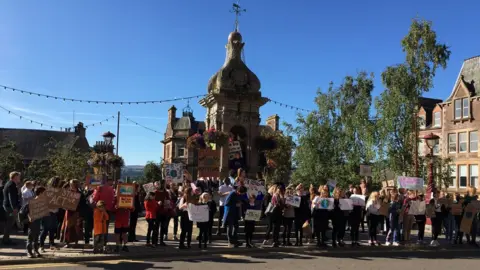 @EticaConsults
@EticaConsultsCampaigning organisations Friends of the Earth Scotland and Global Justice Now closed their offices all day to participate in the protests.
Friends of the Earth Scotland climate campaigner Caroline Rance said: "Millions of schoolchildren across the world have been walking out of lessons every Friday to strike for climate action.
"The children are marching for their future. We're proud to stand with them and urge everyone else who can to do the same."
